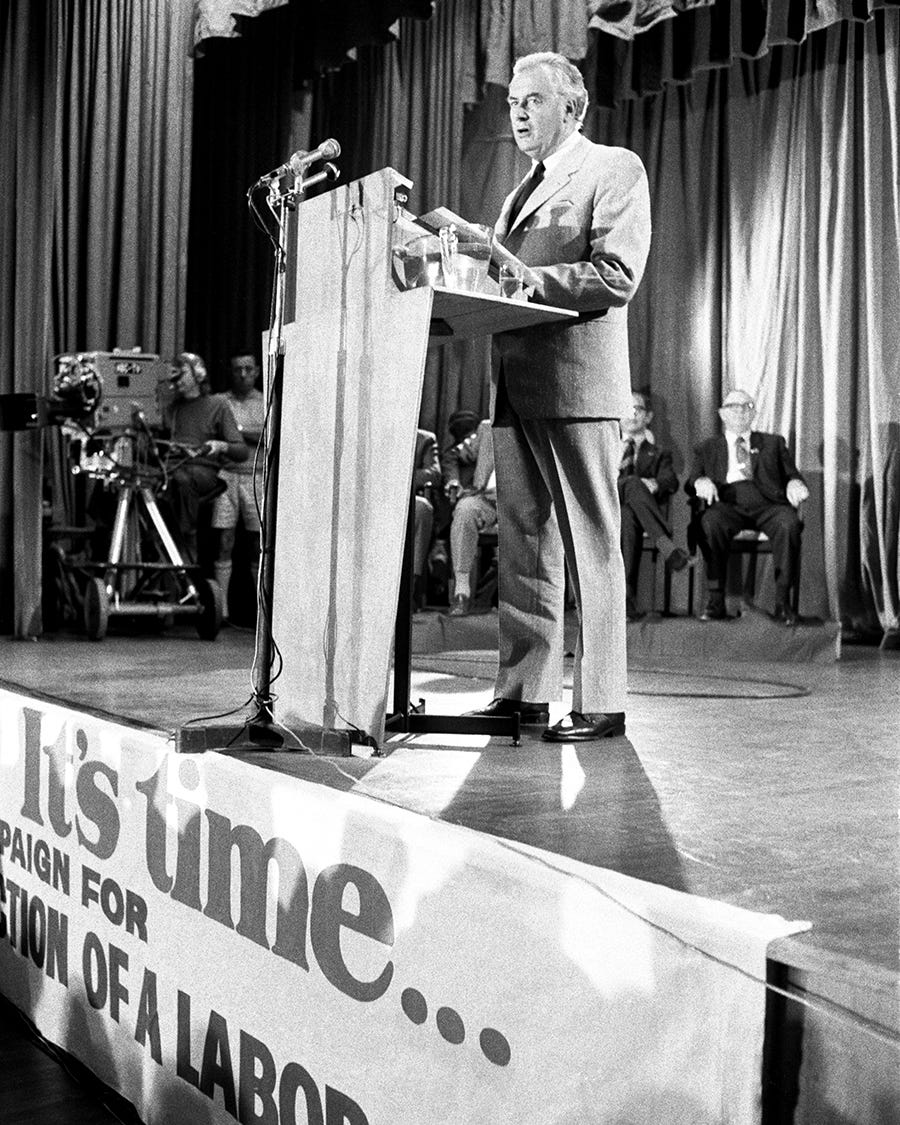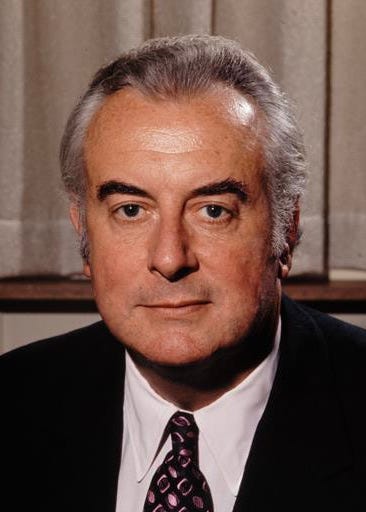Well may we say ... 50 years today
Is it the greatest ever Australian speech? Maybe not. But it's definitely the greatest ever Australian soundbite!
The famous bit starts at 1.50 above
Good news! A new episode of the Speakola podcast will drop in the next few days. It’s an interview with The Church’s Steve Kilbey, who wrote ‘Under the Milky Way’ and delivered one of the great ARIA Hall of Fame induction speeches in 2010.
Fifty years ago today, Gough Whitlam stood one the steps of what’s now Old Parliament House in Canberra, and listened to the Governor General’s Official Secretary, David Smith, read a proclamation that announced that he had been sacked as Prime Minister, and both houses dissolved pending an election. For overseas readers, this is as dramatic as political life gets in Australia. An elected government that enjoyed majority support in the House of Representatives was dismissed by the Queen’s representative, Sir John Kerr, who had been appointed by Whitlam sixteen months earlier. It runs counter to the principles of responsible government which are core to the Westminster system. I was taught by my Labor voting father that it was a shameful and undemocratic moment, and I still believe it to be so. There is a Liberal Party counter-view that speaks of profligate debt and shadily sourced government loans, all serving as justification for Opposition Leader Malcolm Fraser’s decision to block supply (our equivalent to the shutdown that’s recently occurred in the USA, public servants don’t get paid) which prompted Kerr to action. It’s an incredible story, and if you’re half interested in Australian history you MUST listen to a seven part podcast called ‘The Eleventh’ by Alex Mann.
It’s difficult for overseas readers to comprehend how famous this speech is. Whitlam was (and still is) a politically polarising figure. He was a huge personality and intellect, with a booming voice and staggering ego. In 1972, he swept into power with an ‘It’s Time’ slogan — and set about implementing a radically progressive agenda. Within his first term he ended conscription and Australia’s involvement in the Vietnam War, recognised the People’s Republic of China, abolished fees for tertiary education, and started the process for the universal healthcare scheme, Medibank (now called Medicare, and Americans, it is much loved here in Australia — you lose elections if you try to water it down!)

Much of this reform was done by decree, as Whitlam and his deputy, Lance Barnard, formed a temporary “duumvirate” or “cabinet of two’, before the full Labor caucus could elect a larger ministry. In 1974, the Whitlam government squeaked back into office, and crucially, numbers were tied in the Senate. If a senator died, and the casual senate vacancy conventions were ignored by a conservative state government, the power to block supply could be handed to an opportunistic and conspiring opposition.
A senator died.
If you’re not going to listen to the podcast above, watch the 80s miniseries.
But back to the speech.
It’s a virtuoso performance at a moment of personal and national crisis. Whitlam was famously witty and erudite. He was once asked, ‘what would happen to the Government if you fell under a bus tomorrow?’, to which he answered — “with the improvements my government has initiated in urban transport this is unlikely to happen”.1 If anyone was equipped to rise to the moment, it was Gough,
And rise he did.
Here is the transcript as recorded in Sally Warhaft’s excellent (but out of print), ‘Well May We Say … The Speeches That Made Australia’ speech anthology:
Ladies and gentleman (applause and cheering), well may we say God Save the Queen (pause) because nothing will save the Governor-General (applause and cheering).
The proclamation which you have just heard read by the Governor-General’s official secretary was countersigned ‘Malcolm Fraser’ (boos and jeering) who will undoubtedly go down in Australian history from Remembrance Day 1975 as Kerr’s cur.
They won’t silence the outskirts of Parliament House, even if the inside has been silenced for the next few weeks (cheering).
The Governor-General’s proclamation was signed after he already made an appointment to meet the Speaker at a quarter to five.
The House of Representatives had requested the Speaker to give the Governor-General its decision that Mr Fraser did not have the confidence of the House (pause) and that the Governor-General should call me to form the Government. . . (cheers and applause).
Maintain your rage and enthusiasm through the campaign for the election now to be held and until polling day.
An interesting tit-bit I found on the National Film and Sound Archive site relates to David Smith’s use of ‘God Save the Queen’ at the end of his proclamation. These were provocative words, and without them, we couldn’t have had the most famous ad lib in Australian history. Here are the notes compiled by the NFSA curator:
The spontaneity of Whitlam’s attack on the Governor-General, Sir John Kerr, is obvious, prompted by the final words of the Governor-General’s Official Secretary, David Smith, ‘God Save the Queen’. That they were not scripted is confirmed by Whitlam’s then Press Secretary, Evan Williams, speaking in 2010, ‘They came straight out of his own head and very much on the spur of the moment. They were not scripted.’
What was not fully understood until the publication of David Smith’s book Head of State in 2005 was that there was a history to the words used by Smith, a subtext that may have influenced Whitlam’s reaction. In April 1974, the opposition led by Billy Snedden refused in the Senate to consider two appropriation bills passed by the lower house. Prime Minister Whitlam used this as the trigger for a double dissolution, where both houses face a simultaneous election. When the proclamation to dissolve parliament arrived on David Smith’s desk, he pointed out to the then Governor-General, Sir Paul Hasluck, that the customary words ‘God Save the Queen’ were not on the bottom of the proclamation. Smith wrote that he asked the deputy secretary of the Attorney-General’s department, Ewart Smith, for an explanation.
‘He told me that the proclamation had been submitted to the Prime Minister in the customary form, but that it had been returned to the Attorney-General’s Department with a wavy line drawn through the request to the Almighty and with a notation in the margin in Whitlam’s handwriting, “We’ll have no more of this nonsense”.’ Nineteen months later, at 1 pm on 11 November 1975, Sir John Kerr, Whitlam’s own appointee, sacked Whitlam and swore in Malcolm Fraser, leader of the Opposition, as caretaker Prime Minister after requiring him to sign a promise to call an immediate election of both houses. David Smith was required to call Ewart Smith again, to prepare a proclamation to dissolve both houses. On his own volition, David Smith told Ewart Smith, ‘One more thing, Ewart, don’t forget to put “God Save the Queen” back in’.
This was the proclamation that David Smith read on the steps of Parliament House at 4.45 pm that Tuesday afternoon. It’s clear that Whitlam reacted directly to hearing these words, because he starts his response by repeating them. ‘Well may we say “God Save the Queen” …’
It is likely that only he and David Smith understood the significance of these words in the proclamation at that moment. Whitlam’s prediction was prophetic: Sir John Kerr was vilified and denounced by demonstrators at many of his public appearances after this day, until he stepped down prematurely as Governor-General in December 1977.2
Australia’s current Labor Prime Minister, Anthony Albanese, acknowledged Gough Whitlam and The Dismissal in a speech yesterday. Tonight, there will be a dinner at Parliament House. I know this because my friend and former Speakola podcast guest, Sammy J, is hosting and performing. ‘I’ll see how I go doing my Gough song a few metres away from John Howard’ he texted this morning.
His episode of Speakola podcast is great too.
Gough Whitlam died in 2014 aged 98. The eulogy by Noel Pearson is another of the great Australian speeches, and one of the first included in the Speakola collection. Towards the end of their lives, Whitlam and Malcolm Fraser mended some bridges, and became advocates for an Australian republic.

If you like Speakola but feel more comfortable with either Patreon or a one off donation, any help is always appreciated.
Race Around the World rebooted!
The ABC announced this week that the television show that gave me a break 28 years ago, Race Around the World, is returning in 2026. This is great news. Here is my reaction to that, as well as a Good one, Wilson announcement that I’ll share application tips for aspiring Racers.
My optometrist, Richard Lindsay, told me about this one at my appointment today. I found the reference https://www.whitlam.org/whitlam-legacy-cities-and-suburbs
https://www.nfsa.gov.au/collection/curated/asset/96778-kerrs-cur-speech-gough-whitlam




Great article on an important topic. My piece on the same drawing compares with supply issues in the US.
https://open.substack.com/pub/preceperi/p/remember -remember?utm_source=share&r=5h1r4j